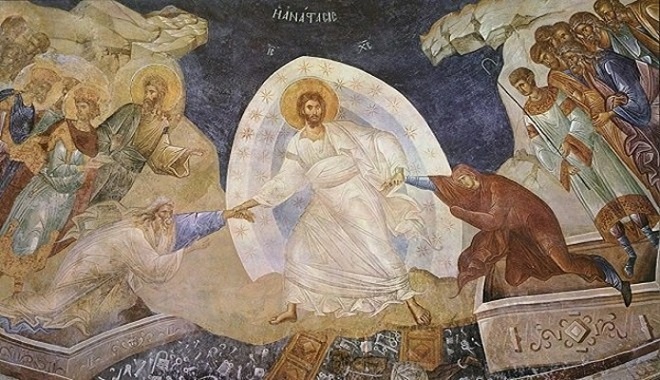The First-Born of the Dead and the Land of the Living (4)
18 May 2022[Previous post: https://bit.ly/3srvCCW]
God doesn’t impose himself on people in a high-handed manner. The kingdom of God isn’t a kingdom of imperious authority but of interactive love and freedom. It’s a communion which offers boundless love and freedom. But when people reject God’s offer, they’re short-circuited within their self and make their own punishment. In this way, even from this transitory life they enter hell and despair.
In his penetrating work On the Life in Christ, Saint Nikolaos Kavasilas writes that life in Christ is born in this present life and completed in the future. And it can’t be brought to completion in people’s souls, either in the present life or in the future one, unless it starts here. More specifically, he says that, just as there are the bodily senses of sight, smell, hearing, etc. for this life, so there are spiritual senses for the next life. The present life is the workshop in which the spiritual senses are prepared. Those who haven’t acquired spiritual senses here will remain ‘dead and wretched’ throughout eternity. God will offer himself to all as light, but they’ll remain in the dark, like the foolish virgins, because it won’t then be possible to form eyes. The fragrance of the Holy Spirit will fill all things, but they won’t acquire the sense of smell unless it’s already there. Those who haven’t acquired spiritual senses before they depart this present life will have nothing in common with the future one, whereas the friends of God, having spiritual senses, will share in eternal bliss with Christ (PG. 150, 493B ff.).

Pure spiritual senses, a pure heart, make people blessed and able to see God (cf. Matth. 5, 8). With Christ’s resurrection, which constitutes the quintessence of the divine revelation, ‘all things are filled with light’. This isn’t something which is simply to be believed; it can and must be experienced. Christ wasn’t the prophet of the resurrection and of the kingdom of God but the active agent of it. He didn’t foretell things that would happen in the future but brought these things into the present and made it possible for everyone to be able to share them, up to a point. And each person participates in them to the degree to which their purity and receptiveness allow. The canon of the Resurrection encourages us to ‘cleanse our senses and we shall see [Christ] in the unapproachable light of the resurrection’. The light of the resurrection is the light of God’s kingdom; it’s the light of the future age which exists and is revealed, as a foretaste, to those who cleanse their senses even in this life, to the extent to which they’re able to do so.
The progress of the faithful towards the resurrection is accomplished, as was that of Christ, through the ascent to Golgotha. ‘We must go through many hardships to enter the kingdom of God’, says the Apostle Paul (Acts 14, 22) [1]. And the ascent to Golgotha, which is a descent of humility, is made easier by the expectation of the resurrection. The Creed ends with the expectation of the resurrection of the dead. The more intense this expectation is, the richer is the Christian life. Here we see the ‘excess’ of life which Christ brought to the world with his coming (cf. John 10, 10).
Just as Christ was crucified, buried and rose, so his Church, the members of his body, all the true faithful, make their way towards the resurrection through crucifixion and burial. The life of the Church and of the faithful within history might be termed life in the grave. To put it even more clearly, the life of the Church and of its members in the world retains its authenticity only when it’s experienced as life in the grave. Then it’s confirmed that the faithful don’t live according to their own will but in conformity with that of Christ; or that Christ lives within them. As Saint Paul says: ‘I no longer live, but Christ lives in me’ (Gal. 2, 20).
This is how the unity of the Church is preserved. It isn’t founded on the life of its members but on the life of Christ. People aren’t called upon to fashion the unity of the Church but to espouse it and observe it. And these things aren’t brought about by noise and activism, but by silence and calm. The faithful are humbled, they’re obedient to their head, who is Christ, they conform to his will and tread his path. They don’t follow new ways and don’t even invent them with their own will and imagination.






